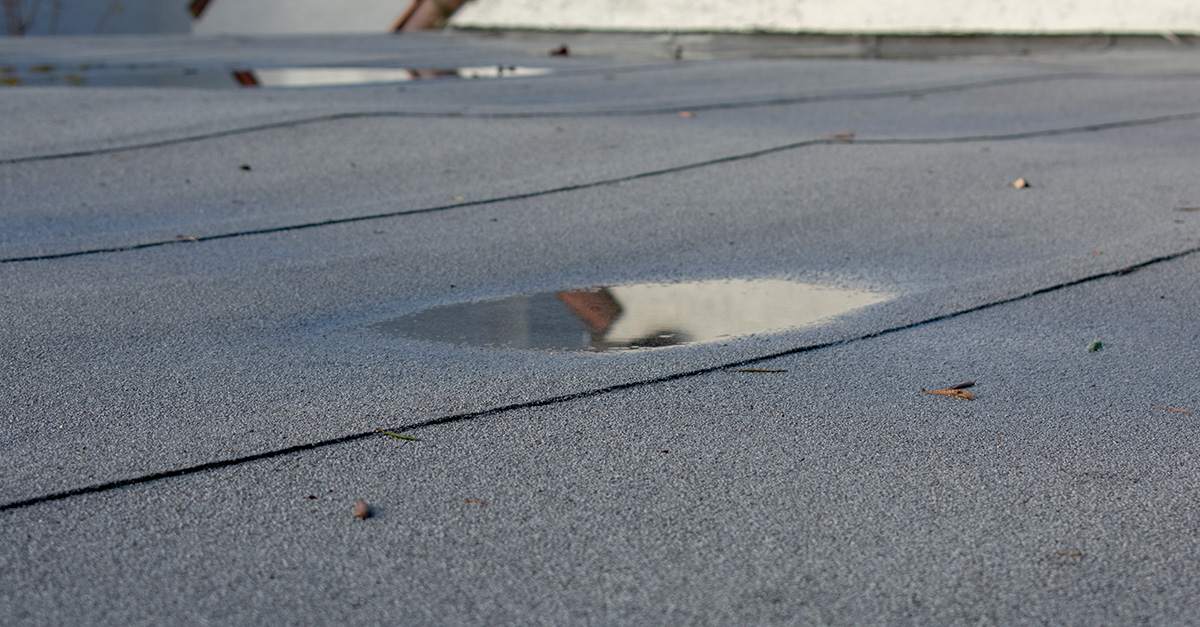Gear up for the rainy season! Florida has no shortage of heavy rains and harsh winds. Prior to disaster striking, commercial roof owners should take the necessary steps to ensure that their roofs can withstand inclement weather conditions without acquiring leaks and costly repairs. Invest in the future of your roof today by consulting the best commercial roofing company in Tampa, Aderhold Roofing.
Related: Why You Should Repair Your Roof Before the Rainy Season Hits
Improper Drainage
Commercial buildings typically require special drainage solutions due to their flat or low-sloped roofs. Rather than relying on gravity as pitched roofs do, commercial roofs require scuppers and interior drains to collect rainwater. If the drainage system is poorly designed, poorly installed, or simply clogged, the weight of collected water can quickly overload the weight capacity, leading to backlog and collapse. Water collection, or ponding, may also develop in areas of the roof that are too flat for positive drainage or where a depression has formed. This will lead to a compression of insulation, sinking of materials, and creation of low points, all of which are likely to lead to water getting in your building.
Membrane Damage
Damage to roofing membranes ranks high on the list of common sources of commercial leaks. The membrane is an integral part of your commercial roof, designed to prevent water from reaching the building’s interior by helping seal and waterproof flat roofs. However, as the roofing membrane ages or inclement weather conditions occur, the membrane can become damaged. When this happens, you may see your roof’s membrane start to crack, split, blister, shrink, or puncture, giving way to the insulation beneath. Equally important is the flashing, or protector of the edges of the membrane, which can become loose during storms or expand and contract as a result of changes in temperature, leading to gaps and leaks.
Related: Vital Elements Connected To Flat Roof Functionality
Open Penetrations
Roof penetrations are found on the majority of flat commercial roofs and can include HVAC units, vents, pipes, hot stacks, gas lines, and any other systems that come through the roof membrane. Any and all roof penetrations are prone to leaks and should be properly sealed to ensure the roofing system is protected from water damage. This includes making sure each of the penetrations is kept watertight with field wraps, flashing, pipe boots, rain collars, or pitch pans. The more roof penetrations you have, the greater the likelihood of your commercial building experiencing a leak. It is important to avoid unnecessary penetration to the roof membrane as well as penetrations placed so closely together that they cannot be individually flashed.
Roof Nearing the End of Its Lifespan
Even if all other major problems on this list have been avoided, no commercial roof will last forever. You may begin to experience rapid deterioration, especially if your flat roof is fifteen to twenty years past its initial installation. It’s time to consult with one of the top commercial roofing companies in Tampa regarding whether or not you should opt for roof repair or preservation to extend the lifespan of your roof or invest in a roof replacement. Aderhold Roofing will address the needs of your business alongside your budget, conduct a thorough onsite inspection, and determine which roofing option is right for you. If you opt for a roof replacement, we will move to implement preservation measures for your investment, such as annual or semiannual inspections. Whether you’re in need of a total replacement or simple maintenance, our licensed roofing professionals are here to help.
To speak with a professional about commercial roof leak in Tampa, or to schedule a consultation, please submit our contact request form.
Disclaimer: The information contained in this article is for general educational information only and is not intended to be a substitute for professional counsel.

